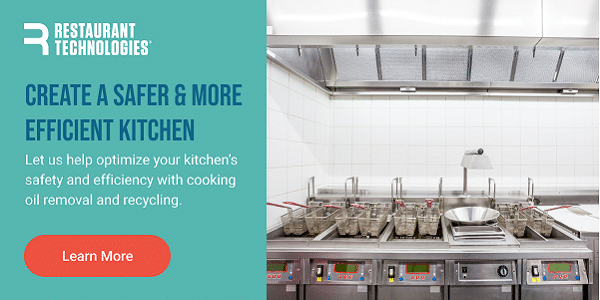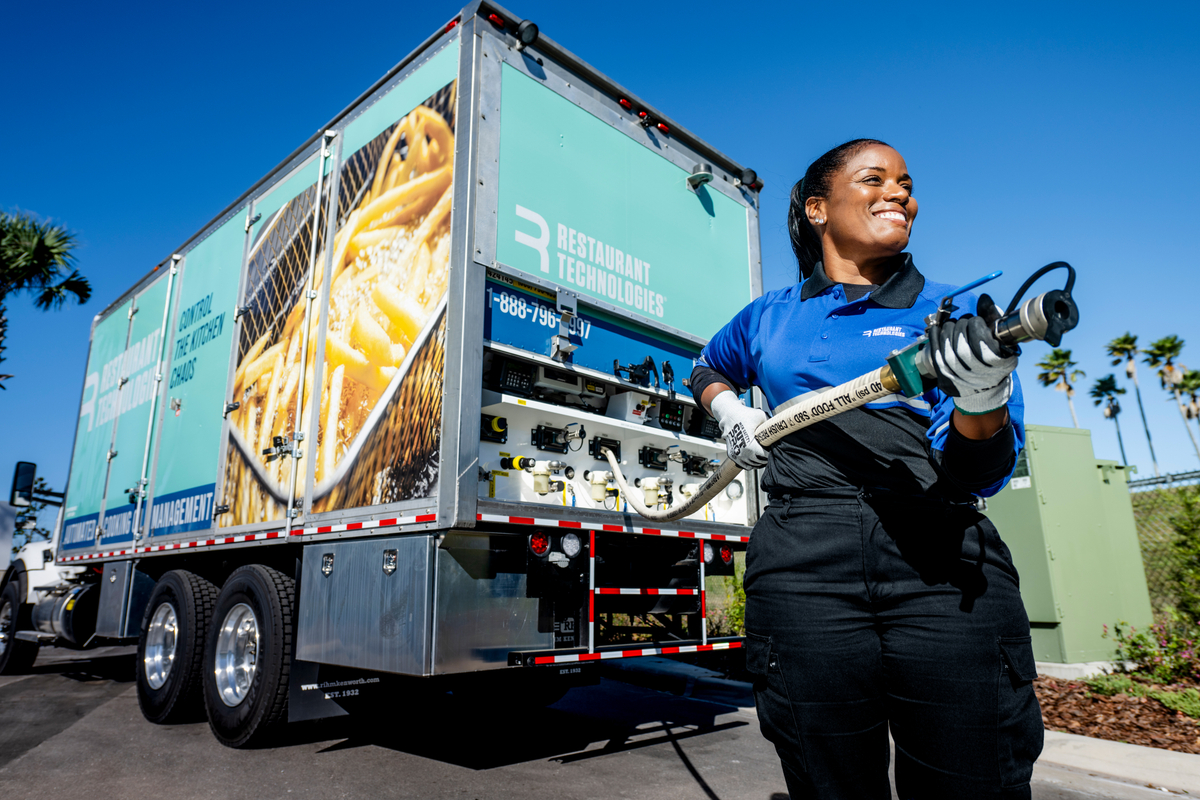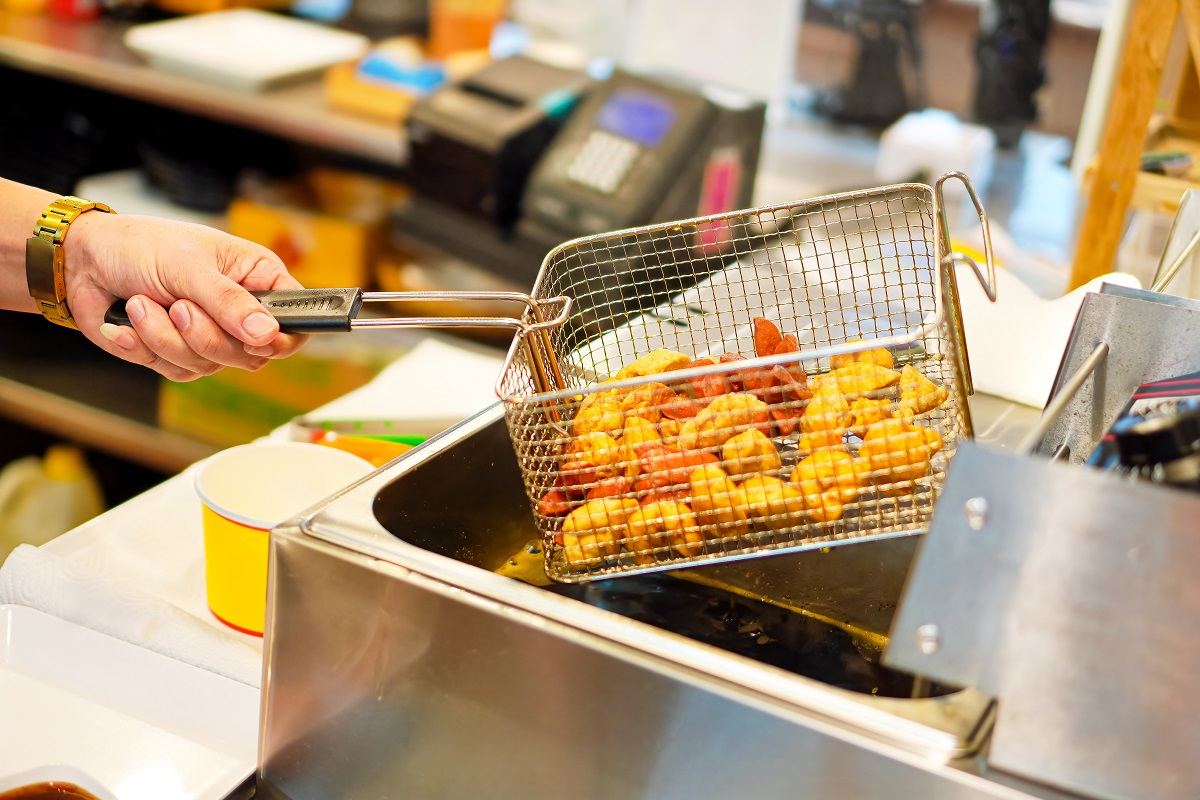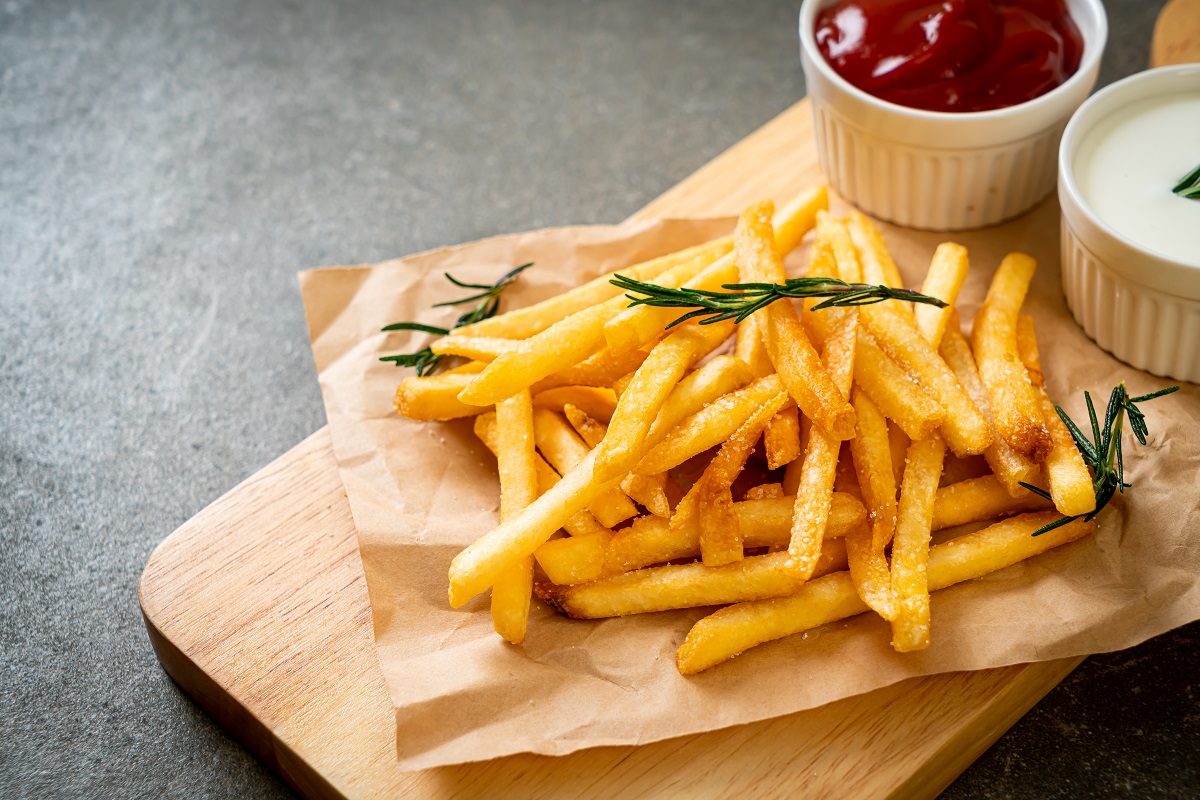In October of 2023, Chick-fil-A made headlines when more than 800 gallons of used cooking oil were stolen from one of the franchise’s locations in Athens, Georgia.1 It may have seemed wildly perplexing to some, but it’s certainly nothing new: “Grease thieves,” as they’re colloquially called, have been stealing cooking oil since its value became known.2
But why does used cooking oil theft happen? And, perhaps even more importantly, what can you do to safeguard your own supply?
This guide was written with restaurateurs like you in mind. Whether you manage a QSR or own a bustling cafe, we have the details you need to keep cooking oil thieves at bay.
Used Cooking Oil Theft
The Athens case touched upon above is indicative of a larger problem. Indeed, police in Suffolk County, New York report that they saw more than 100 cases of cooking oil theft throughout their county in 2023 alone.3 Typically, thieves arrive at restaurants in the middle of the night to siphon oil from outdoor containers and sell it on the black market.
Cases such as these underscore the importance of proper safety protocols and savvy cooking oil management. And yet, why is cooking oil increasingly referred to as “liquid gold?”
Why Are Thieves Stealing Used Cooking Oil?
Used cooking oil qualifies as a FOG (fat, oil, or grease), or plant and animal oils that are widely used in food production (and particularly in restaurants in all of their forms). These oils are often broken down into two categories4:
- Brown grease, or old oil, is obtained from grease traps and is difficult to reuse.
- Yellow grease refers to used cooking oil that hasn’t been contaminated and, on the flip side, is renderable and recyclable through the use of methanol and extraction processes.
Both cooking greases may seem useless after they’ve been, well, used. However, uncontaminated, “yellow grease” is leveraged in an array of ways, namely:
- Biodiesel production – One of the primary reasons grease thieves are going after used cooking oil is to sell it for use in renewable biodiesel production.5 Put simply, biodiesel plays an enormous role in renewable energy. As a clean-burning alternative to traditional fossil fuels like petroleum, it has an equally impressive number of applications in transportation, electricity, and more.6
- Animal feed manufacturing – Used cooking oil is essential to animal food manufacturing, as it serves as a calorie-dense ingredient in livestock feed.7
- Industrial applications – Yellow grease is also a common ingredient in a wide variety of industrial products, including soaps, detergents, shampoos, cosmetics, and rubber.8
Is Used Cooking Oil Valuable?
While it’s mainly stolen for renewable biodiesel production, its sheer versatility also explains why stolen cooking oil has become a hot commodity. The statistics are there to prove it, too:
- According to a slightly older report published by Bloomberg, over 1.4 billion pounds of old oil was turned into biodiesel in 2016 alone. While it’s unclear how much stolen oil was used in its production, it showcases the need for it; it also illuminates why an estimated $75 million worth of used cooking oil is stolen per year.9
- Fortune Business Insights reports that the global market value of used cooking oil will skyrocket to an estimated $10.08 billion by the time we ring in 2028.10
- Another recent report published by the United States Department of Agriculture indicates that used cooking oil is priced between 21 and 41 cents per pound, depending on where it was sourced.11
- The global renewable biodiesel market is expected to increase to $79.2 billion by 2032.12 What’s more, the Renewable Fuel Standard program, which was established under the United States Clean Air Act of 2005, insists that renewable fuel must replace a portion of fossil fuels in home heating, jet fuel, and transportation fuel.13 This has substantially increased the demand for biodiesel—and the demand for used cooking oil.
Meaning, there’s a reason why grease thefts are on the rise and even more of a reason to protect your food establishment.
Assessing Your Vulnerability
Storing your used cooking oil in an outdoor receptor? You’re not alone: It’s common in restaurants as they may face steep legal fines for improperly disposing of the commercial kitchen staple.14 And yet, doing so may make your eatery a prime target for cooking oil thieves.
With this in mind, there are ways to evaluate your risk potential.
Common Security Flaws
It may be mere oversight (or the fact that running a restaurant requires around-the-clock work without having to think about cooking oil theft), but you may be at greater risk if your security system is flawed. Consider, then, asking yourself15:
- Are my cooking oil containers padlocked? This isn’t an airtight security measure, but it may help prevent some grease theft.
- Are they stored in an area that’s illuminated with bright lights?
- Have you installed surveillance cameras if your cooking oil containers are stored outdoors?
If you answered no to any of these questions, think about implementing the tips below.

Effective Strategies to Deter Thieves
There are a handful of ways you can protect your cooking oil and your bottom line:
- If possible, store your cooking oil indoors in a safe spot, or weigh the benefits of a storage unit while you await waste disposal.
- If you must store your cooking oil outdoors, up-level your outdoor security with security lighting, cameras, and alarms. Additionally, post signage stating that the area is closely monitored.
- Conduct regular training with your staff so that your whole team remains on guard about suspicious activity.
Further, consider technological solutions and monitor and response measures.
Technological Solutions
Technological advances have fundamentally changed how cooking oil is protected. Restaurant Technologies’ Total Oil Management, for one, ensures secure:
- Delivery
- Storage
- Filtering
- Monitoring
- Recycling
You might also choose to install an automated fuel tank alarm that can alert you if your tank suddenly plummets.
Monitor and Response
The escalation in cooking oil thefts has a silver lining: More and more restaurants are learning that they need to dial up their vigilance and revamp their security measures.
You can work this to your advantage by joining forces with other eateries in your area and sharing the latest news on robberies, questionable activity, and fresh ideas on enhancing your security.
So, what do you do if you witness something out of the ordinary? Your first order of business is to notify your local law enforcement, not to attempt to handle suspicious activity or theft on your own or with your team members. If a theft does occur, aim to obtain key information on the “getaway” vehicle, including its make, model, color, and license number.
Next, contact your oil management company to report what occurred—and know that with Restaurant Technologies, you’ll have compassionate 24/7 support.
The Role of Professional Oil Management Systems
Professional oil management systems like Restaurant Technologies can be one of your strongest lines of defense against cooking oil theft.
In addition to the secure oil delivery and storage services mentioned above, we also offer restaurant rendering tanks that help mitigate theft by picking up used oil via a secure outdoor fill box. Ultimately, the less used oil you have on-site, the less attractive your establishment may be to grease thieves.
That said, helping you prevent cooking oil theft isn’t the only benefit professional oil management systems offer. The potential perks of partnering with one also include:
- Enhanced safety – Handling used cooking oil and hot grease can be a safety hazard for you and your employees. A touchless, automated system like ours can decrease the risk of burns, spills, strains, and falls.
- Improved food quality – Fresh oil delivery naturally translates to higher-quality food. And the more satisfied your guests are, the more likely they’ll be to return. Ultimately, this may bolster your restaurant’s profits. And what restaurateur possibly says no to that?
- Enriched eco-friendliness – Professional oil management systems help businesses curb their environmental impact. How so? Inappropriately disposed of used cooking oil—like tossing it down the train—can make its way into waterways and soil. This may affect both human health and the well-being of ecosystems, even those that may be hundreds of miles away.16
Not only might it be reassuring to know that you’re doing all you can to prevent pollution and boost sustainability, but a mounting body of research shows that customers are significantly more inclined to patronize eco-friendly businesses.17
All of which is to say, if you’re not using a professional oil management system yet, now may be the time.
Secure Your Oil with Restaurant Technologies
An uncertain economy, soaring gas prices, and the growing interest in alternative fuel have driven the uptick in used cooking oil crimes—and suggest they’ll only continue to climb in number.
Restaurant Technologies is on a mission to be an active part of the solution. Our Total Oil Management system can shield your business’s liquid gold through bulk oil delivery, filtration and monitoring, and removal and recycling. In turn, you can worry less about cooking oil thieves and focus more on nourishing and delighting your guests. To enhance your food service operations further, understand how much used cooking oil is worth, wonder if you can recycle oil bottles, and explore how to run a cafeteria—if that’s your industry interest.
Prevent cooking oil theft by joining the Restaurant Technologies family.
Sources:
- Scripps News. Thieves stole $2,000 in cooking oil from a Chick-fil-A, police say. https://www.scrippsnews.com/us-news/crime/thieves-stole-2-000-in-cooking-oil-from-a-chick-fil-a-police-say
- Katom Restaurant Supply, Inc. Used cooking oil theft & the foodservice industry. https://www.katom.com/learning-center/how-restaurants-deal-with-cooking-oil-theft.html
- PIX. Why thieves are stealing used cooking oil. https://pix11.com/news/local-news/why-thieves-are-stealing-cooking-oil
- Montgomery County. What is the difference between yellow grease and brown grease? https://www.mcohio.org/FAQ.aspx?QID=196
- Food and Wine. This is why thieves are stealing cooking oil. https://www.foodandwine.com/news/why-thieves-are-stealing-cooking-oil
- Recognized Trading & Shipping. What is biodiesel? How is it made, who uses it, and what is it used for? https://recognizedtrader.us/what-is-biodiesel-how-is-it-made-who-uses-it-and-what-is-it-used-for
- Extension Outgamie County. Using food waste of livestock feed. https://outagamie.extension.wisc.edu/files/2012/10/Using-Food-Waste-as-Livestock-Feed.pdf
- Waste4Change. 5 things you need to know about used cooking oil (UCO). https://waste4change.com/blog/5-things-you-need-to-know-about-used-cooking-oil-uco
- Bloomberg. Crooks Are After the Grease From Your French Fries. https://www.bloomberg.com/news/articles/2017-05-03/grease-heists-turn-gross-goo-to-gold-for-crooks-in-biofuel-rally
- Fortune Business Insights. Used cooking oil market size, share & COVID-19 impact analysis. https://www.fortunebusinessinsights.com/used-cooking-oil-market-103665
- USDA. Monthly national animal by-product feedstuff report. https://www.ams.usda.gov/mnreports/ams_3669.pdf
- Precedence Research. https://www.precedenceresearch.com/biodiesel-market
- EPA. Overview of the renewable fuel standard program. https://www.epa.gov/renewable-fuel-standard-program/overview-renewable-fuel-standard-program
- Eco of Idaho. Recycling vs disposal: which one is better than the other?https://www.ecoofidaho.com/recycling-vs-disposal-which-is-best-for-used-cooking-oil
- Security By Design. Theft of cooking oil. https://www.securedbydesign.com/guidance/crime-prevention-advice/theft-of-cooking-oil
- Safeway Used Oil & Grease. The environmental impact of improper waste oil and grease disposal. https://safewayusedoil.com/2024/04/the-environmental-impact-of-improper-waste-oil-and-grease-disposal
- McKinsey & Company. Consumers care about sustainability—and back it up with their wallets .https://www.mckinsey.com/industries/consumer-packaged-goods/our-insights/consumers-care-about-sustainability-and-back-it-up-with-their-wallets






